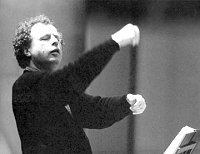S & H Concert Review
Schubert, Beethoven, Schumann, András Schiff (pf/con), Philharmonia Orchestra, RFH, 19th June 2003 (AR)
What was ostensibly a rather conservative programme typical of the Philharmonia Orchestra’s standard repertoire turned out to be a revelatory evening of music-making, with András Schiff excelling himself as both pianist and conductor.His concert opened with a powerfully direct account of Franz Schubert’s Rosamunde Overture. The sustained opening introduction was dark and brooding, with weighty and incisive brass and timpani. The mood shifted with Schiff producing jagged, playful rhythms, making the music dance with a buoyant eloquence. Often this overture can sound effete and lightweight but under Schiff it sounded refreshingly tough and grainy.
The reading of Beethoven’s Symphony No. 6 ‘Pastoral’ veered towards the ‘classical’ rather than the ‘romantic’ with Schiff sounding more akin to Eric Kleiber rather than Wilhelm Furtwangler, taking brisk tempi throughout, and conducting without a baton.
‘Awakening of Cheerful feelings upon arrival in the country’ (Allegro non troppo) – was suitably sprightly, with Schiff having complete control over the throbbing pulse of the music. By contrast the ‘Scene by the brook’ (Andante molto mosso) was restrained and held back, sounding more like background muzac accompanying an airport lounge mural of a sanitised countryside.
Schiff conducted ‘Merry gathering of country folk’ (Allegro) with rhythmic swagger and bucolic jollity, evoking a Breughel village kermesse, extracting some very tough and muscular string playing; disappointingly the ‘Thunder Storm’ (Allegro) had the sensation of being experienced safely from indoors, with Andrew Smith’s timpani sounding intense but never truly threatening: this was tamed nature with even the cello’s’ and double basses’ rumblings sounding subdued.
An element of serenity and calm shone through in the ‘Shepherd’s Song: Thanksgiving after the storm’ (Allegro) with Shiff holding back and allowing the notes to shine, particularly from the Philharmonia strings who played with a shimmering delicacy. This civilised reading was extraordinarily subtle and sensitive, devoid of ego, excess and the eccentricity to which this popular ‘programme’ symphony often lends itself. (Or rather, conductors who tend to read this score far too literally).
The highlight, and focal point, of the evening was Schiff’s radical reading of Schumann’s Piano Concerto in A minor, Op.54. Conducting from the keyboard seemed to add a degree of risk and edge to Schiff’s magnetic playing, which in turn produced a powerful interaction between piano and orchestra. His stern reading of the Allegro affettuoso eschewed the usual romantic inflections and was played at a far quicker pace than we are accustomed to. This was Schiff’s radicalism: stripping away the clichés and interpreting the work anew. Schiff gave the interlinking Intermezzo: Andantino grazio a new lease of life making it sound less serene and more severe, playing with a deliberately brittle tone which gave the music even greater poignancy, further emphasised by the cello’s expressively deep, dark tone.
As a conductor, Schiff’s subtle and economic gestures produced playing of great precision, sensitivity and intensity throughout, making the orchestral parts sound richer, with greater darkness and dissonance. Indeed, Schiff’s conducting reminded one of Otto Klemperer’s account with Annie Fischer and the same orchestra, but with Schiff making the concerto sound far more ‘weighty’ and symphonic than is usual.
Throughout this inspired and seemingly spontaneous reading - for there was nothing consciously contrived about his playing - Schiff’s appearance was quite extraordinary, suddenly springing up from his stool to stand and conduct with elegant beckoning, exhorting hand gestures; whilst playing, he seemed to throw his notes into the air with wild abandon. Being both conductor and soloist there was no internal conflict, and the concerto was seamlessly and perfectly realised with great unity and added force. This was in no small measure due to the orchestra’s perfect comprehension of his every economic gesture, and having total rapport with the conductor’s immaculate interpretation of the work.
Alex Russell

 Return to:
Return to: